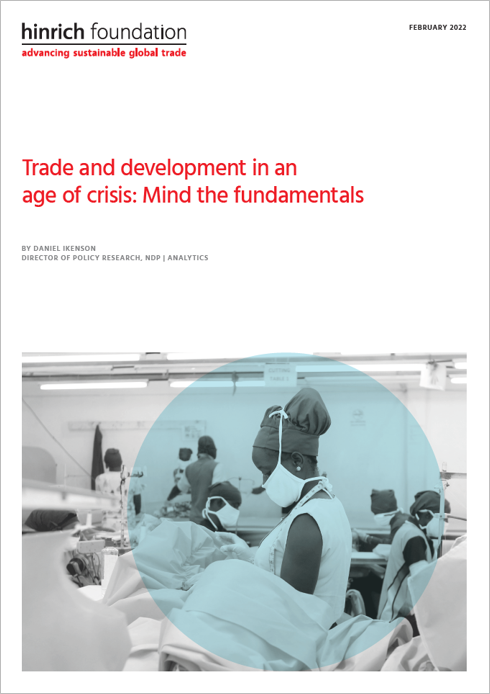Trade distortion and protectionism
Trade and development in an age of crisis: Mind the fundamentals
Published 15 February 2022
Trade liberalization is not a panacea that always produces the same positive economic and social gains in all settings. However, trade openness is necessary for developing countries to sustain economic growth and social progress. Despite the unique challenges of the present, developing-country policies must continue to mind these fundamentals.
As 2022 begins, the world is facing some daunting challenges. A still raging pandemic, looming climate crises, and precarious macroeconomic trends threaten lives and livelihoods, while deepening geopolitical discord and doubts about globalization make international cooperation more complicated.
A disproportionate share of these challenges – indeed, these burdens – will continue to be borne by people in poorer countries, where financial resources are scarce, social safety nets and public infrastructure are weak, and less diversified economies are not as resilient to shocks. Although it is imperative to meet these pressing challenges, the burdens of doing so are no excuse for governments to backslide into trade protectionism.
In this paper, Daniel Ikenson of ndp | analytics demonstrates that economies that are more open to trade and investment tend to grow faster and attain higher levels of social development than economies that are relatively closed. Amid the challenges of the present, Ikenson reminds us that economic diversification enabled by trade liberalization allows countries to absorb and rebound from shocks, and generates higher living standards.
Download Trade and development in an age of crisis: Mind the fundamentals by Daniel Ikenson:

Download the other papers in this Benefits of Trade series by Daniel Ikenson:
© The Hinrich Foundation. See our website Terms and conditions for our copyright and reprint policy. All statements of fact and the views, conclusions and recommendations expressed in this publication are the sole responsibility of the author(s).
Author
Daniel Ikenson
Daniel Ikenson is an economist and renowned international trade expert who has spent over 30 years analyzing, communicating, and influencing the formulation of US and global trade policy. In 2021, Daniel joined ndp | analytics after nine years as director of the Cato Institute’s Center for Trade Policy Studies, where he led a team of lawyers, economists, and political scientists conducting research on all manner of trade policy.
Have any feedback on this article?
Related Articles

Reduced trade barriers on vaccines can balance economic recovery
31 August 2021

Advancing sustainable development in Asia: What role for trade and investment?
03 November 2021

Mercantilist reciprocity or free trade: Globalization at a crossroads
19 October 2021

A call for openness in a time of lockdowns – and protectionism
16 November 2021

Reduced trade barriers on vaccines can balance economic recovery
31 August 2021

Advancing sustainable development in Asia: What role for trade and investment?
03 November 2021

Mercantilist reciprocity or free trade: Globalization at a crossroads
19 October 2021

A call for openness in a time of lockdowns – and protectionism
16 November 2021

Reduced trade barriers on vaccines can balance economic recovery
31 August 2021


